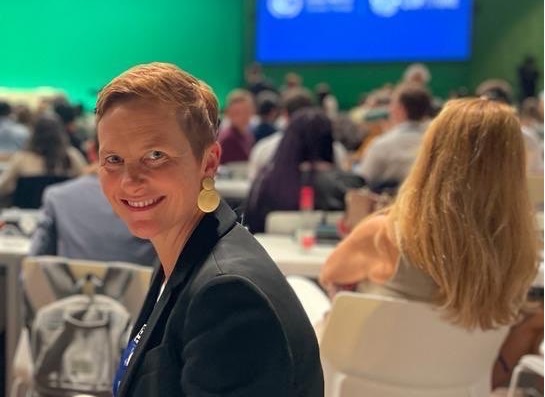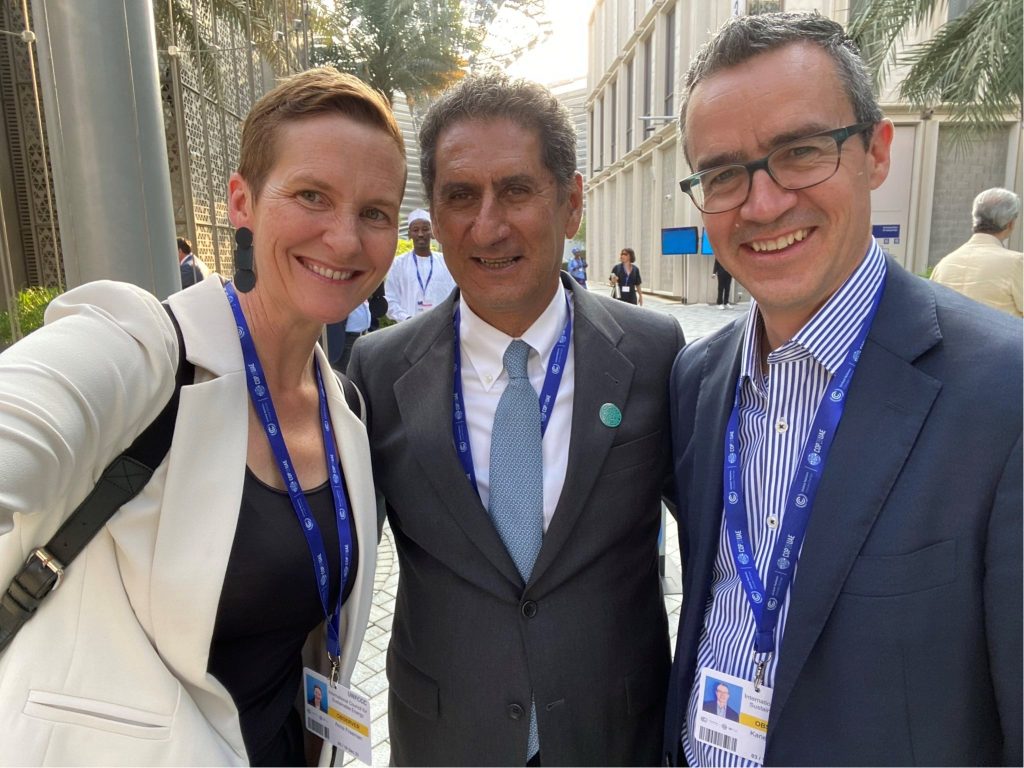Dispatch from Dubai: why Anna Freeman is ‘going home with a sense of urgency’ after COP28
ARENA met with Anna Freeman, Director of Decarbonisation Policy for the Clean Energy Council (CEC) at the Mohammed bin Rashid Solar Park, the biggest solar farm in the world, to discuss her agenda after COP28, the key role electrification plays in Australia’s renewables story and gender equality.

How have you found COP28 compared to earlier COPs?
What strikes me is that they’re all so different. At the last two COPs, renewables have really come to the forefront of the Australian story. We’re deeply committed to climate action and renewables are central to that. I’ve seen an immediate difference in the Government making it clear that was the anchor of its focus – transforming the economy. The renewable energy story became a critical part of Australia’s international engagement as well. It’s definitely on display in the Australian Pavilion at Dubai – an engaging and open space that’s designed to stimulate conversations about the energy transition in an engaging way that brings people in. It’s been a great example of soft diplomacy for Australia.
I’m struck by how much bigger COP28 is than last year, and that COP was bigger than Glasgow which was in the middle of COVID. Last year was around 40 or 45,000 people – this year it’s over 90,000. What’s interesting is it doesn’t feel busier because the site is more spread out and enjoyable to navigate. The biggest problem with COP is a sense that there’s always about 1000 things going on at any one time and you can only do one of them at a time!
What’s been the highlight so far of your time here?
One of the most wonderful things about COP is simply that it really does bring together leaders of industry, business, environment, civil society groups, the climate movement, and policymakers in one place. It is the most remarkable opportunity to make connections and share ideas. One highlight is walking outside of the Australia Pavilion and bumping into the Head of IRENA, the International Renewable Energy Agency (IRENA), Francesco La Camera. We chatted about transmission, supply chains, social licence and all these issues. Because these people are just floating around, you can have impromptu conversations you wouldn’t have anywhere else, and it’s such a wonderful opportunity.

What do you do with those conversations when you go home? What’s the impact of those conversations?
I found it interesting to just understand what was on his mind and what were the things that he was worrying about. We talked about transmission being of more concern than supply chains. The sense I got was he felt that we could build supply chains quickly if you want to but some of these longer-term or big infrastructure builds around transmission require planning and time. I think the real sense I get from conversations is how the sense of urgency weighs on some international leaders about the fact that the time is really running out. So, I’m going home with a sense of urgency.
What’s your biggest takeaway from COP this year?
It’s significant that energy efficiency is included, as it doesn’t often get the same attention. That’s very closely tied to electrification, because electrification is probably one of the best ways that we can achieve greater energy productivity. I think that will be important and helpful.
What is the most interesting event you’ve attended?
It was fascinating to visit the Green Pioneer, a green ammonia ship, parked in Dubai Harbour. Meeting the team of relatively young engineers from Australia was a real highlight for me, because they have basically retrofitted this ship to be powered by green ammonia. Given current regulations mean the Green Pioneer couldn’t get access to some ports today, their retrofit is an important statement that says a) we can power a ship on green ammonia and b) we can do it safely. Most of the demonstration project shows you can safely hold ammonia, which can be toxic. They showed all the safety procedures, processes and controls that are in place on that ship to make sure that it is safely managed.
I think it’s put a bit of a rocket under some shipbuilders who may have otherwise proceeded slowly.
You attended the Hillary Rodham Clinton panel addressing gender and climate, and gender has been a core theme at COP28. How do you think Australia is tackling Clinton’s points raised at the panel?
We need greater representation of women in the clean energy sector and in the energy workforce, full stop. It’s historically been very low, but it is growing. I believe we’re now at 40% women in the clean energy sector in Australia, which outperforms the global average. We had a clean energy jobs session yesterday and we’ve really shown how women are leaders within the Australian renewable energy sector.
We’ve had the Women in Renewables program at the CEC for about seven or eight years now and it’s been tremendously successful and strongly supported by industry. While it’s starting to bear fruit, there are still areas, sectors and professions in which women are underrepresented.
One of the things that concerns me most is that we’re not necessarily seeing the women get into the senior leadership positions. So, we’re increasing the representation of women in the workforce, but they’re not necessarily making it to that last one or two rungs into the C suite roles. That goes to the sort of work that we’re doing at CEC to support this growth.
We have a mentoring program as well as scholarship programs aimed at supporting women into those leadership roles. We’ve been putting in some important work to make a difference on that front.

ARENA